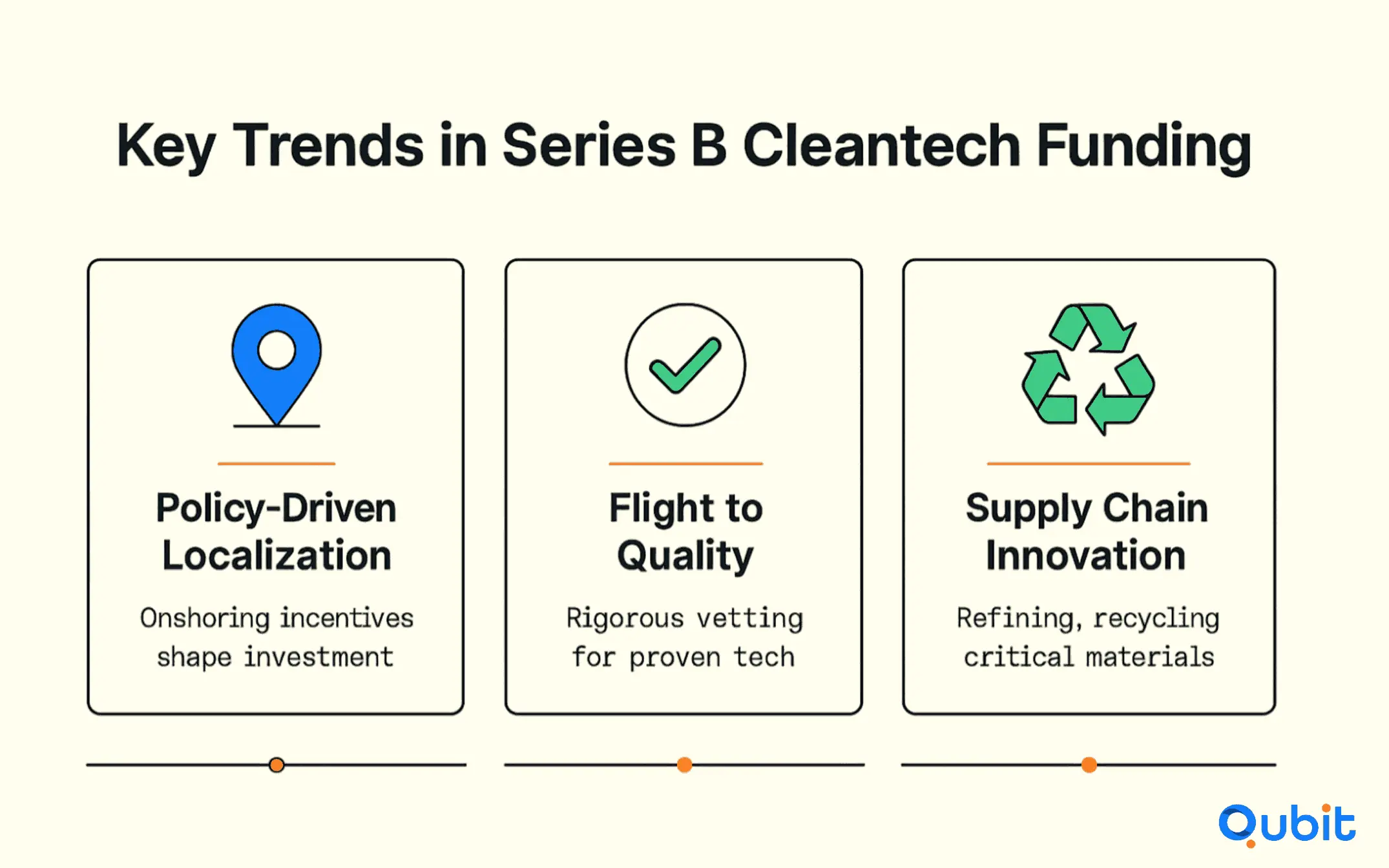Securing Series B+ funding is a pivotal milestone for cleantech manufacturing scale-ups aiming to expand their operations. This stage often demands a strategic approach to attract investors who prioritize sustainability and innovation. By focusing on advanced funding pathways, companies can unlock opportunities to scale their production capabilities while meeting environmental goals.
To set the stage, understanding cleantech startup fundraising strategies offers a foundational backdrop that frames the advanced funding pathways detailed in this guide.
This blog dives deep into Series B+ funding essentials, offering actionable investor insights and strategic guidance tailored to cleantech manufacturing. Let’s jump right in!
Series B Investors Top ClimateTech CleanTech
The manufacturing scale-up phase in ClimateTech and CleanTech has become a focal point for Series B investors, reflecting the growing demand for sustainable solutions at scale. With 722 top investors actively participating in this space, the breadth of opportunities is immense. This section explores the profiles of key firms, market trends, and the challenges startups face in securing Series B funding for manufacturing-focused projects.
The Expanding Series B Investor Landscape
Series B funding has evolved into a critical stage for ClimateTech and CleanTech startups aiming to transition from prototypes to large-scale production. However, the average Series B fundraising timeline extended over two years in 2024, highlighting the increasing complexity of due diligence and negotiations. Founders must prepare for prolonged timelines, ensuring their strategies align with investor expectations.
Key Trends Shaping Series B Investments

- Policy-Driven Manufacturing Localization: Initiatives in the US and EU are reshaping supply chains by incentivizing onshore production and reducing import dependencies. These policies not only expedite manufacturing but also attract investors focused on localized solutions.
- Flight to Quality in Later-Stage Funding: Investors are prioritizing proven technologies, conducting rigorous evaluations to minimize risks. Startups with strong performance metrics and credible innovations stand a better chance of securing funding.
- Critical Materials Supply Chain Innovation: Refining and recycling essential resources for battery production and heavy industry decarbonization are gaining traction. Startups pioneering supply chain technologies can position themselves as unique investment opportunities.
Challenges in the Current Market
Despite the promising outlook, the market faces hurdles. Global climate tech investment in 2024 dropped by 14% to $30 billion, signaling a shift toward more selective funding. Similarly, EU cleantech VC investment fell by 24% year-on-year, amounting to €8.8 billion. These declines underscore the need for startups to differentiate themselves and adapt to regional funding dynamics.
For founders seeking alternative funding avenues, exploring carbon credit financing startups offers insights into non-dilutive capital sources that can supplement Series B funds.
Expanding Funding Pathways: Debt and Hybrid Instruments
As cleantech manufacturing scale-ups mature, relying solely on equity can lead to excessive dilution. Increasingly, companies are supplementing Series B+ rounds with debt financing, green bonds, and hybrid capital structures. These instruments offer non-dilutive capital, especially attractive for businesses with physical assets, predictable revenues, and long-term contracts. By blending equity with private credit or government-backed loans, scale-ups can optimize their capital stack and appeal to a broader investor base.
Leveraging Policy Incentives and State Aid
Evolving industrial policy frameworks, such as new production-based incentives and state aid schemes, are making a significant impact on funding availability. Proactive scale-ups are integrating government guarantees, tax credits, and regional grants into their financing strategies. This not only de-risks investments for Series B+ backers but also strengthens the company’s competitive position in the market.
Building Supply Chain Resilience
With growing emphasis on domestic manufacturing and critical materials security, investors are scrutinizing supply chain strategies more than ever. Demonstrating robust supplier relationships, vertical integration, and compliance with localization policies can set your scale-up apart. Highlighting your approach to securing raw materials and mitigating supply chain risks reassures investors of your long-term viability.
Preparing for Rigorous Due Diligence
The Series B+ fundraising process is more thorough and time-consuming than ever. Investors expect a comprehensive data room, detailed technical and financial documentation, and clear operational milestones. Founders should be ready for extended negotiations and in-depth scrutiny of their business model, team, and go-to-market strategy. Preparation and transparency are key to building investor confidence.
Exploring Alternative and Non-Dilutive Funding Sources
Beyond traditional venture capital, alternative funding options such as carbon credit financing, milestone-based grants, and strategic partnerships are gaining traction. These sources can supplement Series B+ rounds, reduce reliance on equity, and provide additional validation for your business model. Actively seeking out climate funds, government programs, and corporate co-investments can enhance your funding mix.
Engaging Strategic and Individual Investors
While institutional VCs remain important, individual investors, family offices, and corporate venture arms are playing a growing role in Series B+ deals. These investors often bring sector expertise, industry connections, and a willingness to support long-term growth. Tailoring your outreach to align with their strategic priorities can unlock larger checks and valuable partnerships.
Articulating a Clear Path to Profitability and Exit
Series B+ investors are increasingly focused on the road to profitability and potential exit opportunities. Demonstrating a credible plan for scaling revenues, achieving operational efficiency, and securing offtake or customer agreements is essential. Including detailed financial projections and outlining possible exit scenarios, such as IPOs or acquisition, will strengthen your investment case.
Elevating Your Team and Execution Capabilities
Operational excellence is a major focus at this stage. Investors look for experienced leadership, a strong technical team, and a proven ability to deliver on milestones. Showcasing recent key hires, advisory board additions, and successful project execution will help differentiate your company in a competitive funding environment.
Showcasing ESG and Impact Metrics
With sustainability reporting now standard practice, Series B+ investors expect robust ESG and impact data. Clearly communicating your achievements in emissions reduction, resource efficiency, and broader societal benefits can be a powerful differentiator and attract mission-aligned capital. This also showcase how the investment trends are increasing within the green technology.
Competing on a Global Stage
With increased competition from North America, Europe, and Asia, scale-ups must demonstrate how they can compete globally. Benchmarking your technology and business model against international leaders and articulating your unique value proposition will help attract cross-border investors and partners.
Investor Profiles
Series B investors in ClimateTech and CleanTech often focus on scaling technologies that address critical environmental challenges. Firms specializing in manufacturing-focused projects are particularly drawn to startups with innovative solutions in energy storage, sustainable materials, and industrial decarbonization.
As startups navigate this complex funding stage, understanding investor priorities and aligning their strategies accordingly becomes essential.
A review of cleantech IPO illustrates the public-market exit avenues that align with growth strategies following Series B funding, enriching the broader discussion on funding and exits.
Individual Investors
The cleantech investment landscape is increasingly shaped by individual investors who bring unique perspectives and resources to the table. These angel cleantech backers often focus on early-stage companies, providing not just capital but also mentorship and strategic guidance. Their involvement can be pivotal for startups aiming to scale innovative solutions in renewable energy, sustainable agriculture, and other climate-focused sectors.
Typical Investment Ranges
Individual climate tech investors tend to operate within a broad spectrum of investment sizes. For instance, angel investors often contribute anywhere between $25,000 to $250,000 per deal, depending on the stage and potential of the startup. On the higher end, some seasoned investors affiliated with groups like Climate Capital or Mayfield may write checks exceeding $1 million, particularly for companies demonstrating strong traction or groundbreaking technologies.
This diversity in check sizes allows founders to approach investors strategically, tailoring their pitch based on the investor’s typical range. For example, SOSV—a global venture capital firm with a focus on early-stage startups—often supports companies through accelerator programs, offering smaller initial investments but significant follow-on funding opportunities.
Strategic Focus Areas
Individual investors in cleantech frequently align their investments with personal passions or areas of expertise. Some prioritize technologies that reduce carbon emissions, while others focus on innovations in energy storage or water conservation. Climate Capital, for instance, has a strong emphasis on scalable solutions that address climate change directly, often backing startups in renewable energy and carbon capture.
Mayfield, on the other hand, is known for its interest in transformative technologies that can disrupt traditional industries. Their portfolio includes companies leveraging AI and IoT to optimize energy consumption and reduce waste. Founders should research these strategic focuses carefully to ensure alignment when approaching potential investors.
Unique Value Propositions
Beyond financial support, individual investors often offer invaluable resources to cleantech startups. Many bring decades of industry experience, opening doors to partnerships, pilot programs, and regulatory insights. For example, investors associated with SOSV frequently provide access to global networks and mentorship through their accelerator programs, helping startups refine their business models and scale effectively.
Another unique aspect is the flexibility individual investors can offer. Unlike institutional investors, they may be more willing to take risks on unproven technologies or unconventional business models, making them ideal partners for startups pushing the boundaries of innovation.
Tailoring Your Approach
Understanding the diversity among individual investors is crucial for founders seeking funding in the cleantech space. Researching their typical check sizes, strategic focuses, and value propositions can help craft a compelling pitch that resonates with their priorities. Whether targeting angel investors for seed funding or seasoned backers for growth capital, aligning your vision with their interests is key to securing support.
Conclusion
Securing funding for Series B manufacturing scale-ups requires a strategic approach that balances extended timelines, diverse investor profiles, and the evolving policy landscape. By crafting a compelling narrative and structuring your pitch to resonate with investors, you can effectively address their concerns while showcasing the scalability of your business. These strategies not only enhance engagement but also position your company for long-term success in a competitive market.
At Qubit Capital, we understand the complexities of fundraising and offer tailored support to help you achieve your goals. If you're ready to accelerate your Series B manufacturing scale-up, our Fundraising Assistance service provides the expert guidance you need to secure capital. Let’s drive your growth together.
Key Takeaways
- Series B+ funding for cleantech manufacturing scale-ups requires a strategic approach, extended timelines, and thorough preparation.
- Investors are prioritizing proven technologies, strong performance metrics, and supply chain resilience in their funding decisions.
- Policy-driven incentives and state aid are increasingly important for attracting capital and de-risking investments.
- Alternative funding sources, such as debt, hybrid instruments, and carbon credit financing, can supplement traditional equity rounds.
- Tailoring your pitch to align with investor priorities, whether institutional, strategic, or individual, significantly boosts your chances of securing growth capital.
Frequently asked Questions
What is Series B funding?
Series B funding represents a pivotal stage in a company’s growth journey. At this point, businesses that have already established a market presence seek additional capital to scale operations, expand teams, and refine their product offerings. This funding round typically involves larger investments from institutional investors and high-net-worth individuals, reflecting heightened confidence in the company’s potential.


 Back
Back



